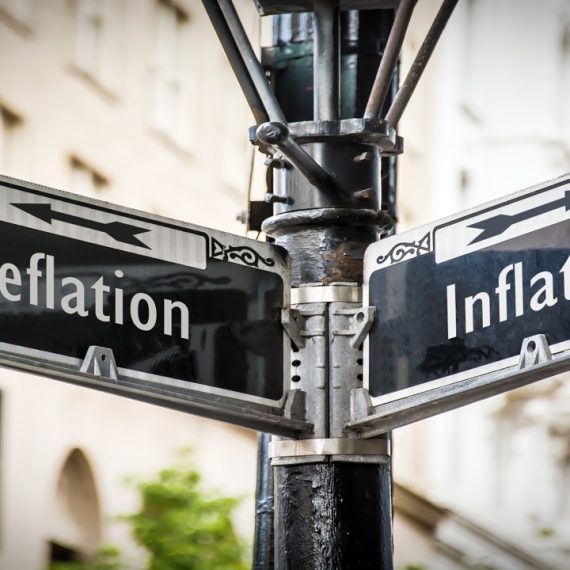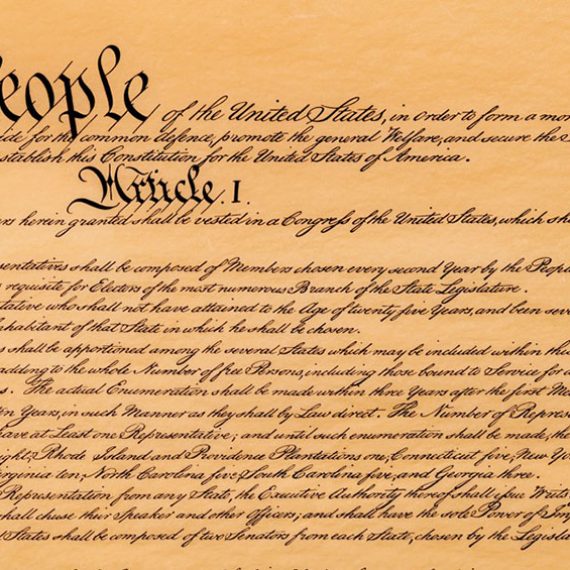May 16, 2005 – There are two principal monetary provisions in the American Constitution. Taken together they make clear the intent of that document’s Framers.
Article I, section 8 states: “The Congress shall have Power…To coin Money, regulate the Value thereof…” The repeated misinterpretation of this clause has enabled it to be misused and abused. There exists a widely accepted but horribly erroneous notion that this clause empowers Congress to make the dollar whatever it decides the ‘dollar’ to be, but the Framers intended something entirely different. To them ‘regulate’ meant the occasional adjustment of the ratio between gold and silver so as to keep the exchange rate of these two monetary metals consistent with their prevailing supply and demand. It clearly did not mean any extension of power to Congress to create a fiat currency not backed by silver or gold, like the dollar as it presently exists.
Then Article I, section 10 states: “No State shall…make any Thing but gold or silver Coin a Tender in Payment of debts.” The meaning of this provision is self-evident. Given the monetary abuses perpetrated by the states, both as a colonial government and under the confederation, the Framers intended that the states be subject to the requirement of fair and just compensation in the repayment of their own debts.
Though the above two provisions are different in the sense that one imposes conditions on the federal government and the other imposes conditions on the states, they do have one thing in common. Both of these provisions are being ignored. To put it another way, the monetary system used within the US today is wholly unconstitutional. In the words of Edwin Vieira, from his truly monumental undertaking, Pieces of Eight: The Monetary Powers and Disabilities of the United States Constitution,(Pieces of Eight)”the monetary system of the United States is [today] the very antithesis of what the Founders contemplated and the Constitution embodies.”
We can ignore this reality, or we can try to do something about it. I have chosen the latter alternative.
GoldMoney provides the means for individuals to protect themselves from the monetary perfidy of politicians, but more is needed. Consequently, I have been participating in a nascent effort to restore sound money in New Hampshire.
Last year State representative Henry McElroy introduced HB 1342, which has been dubbed the New Hampshire Sound Money Bill. This bill enables people to use gold and silver in their transactions with the state of New Hampshire. In other words, if this bill is eventually signed into law, people will be given a meaningful choice. For everyone who needs to transact with the state government, they can continue to do so in terms of fiat currency, i.e., Federal Reserve dollars. Or they can demand that the state of New Hampshire transact with them in gold and silver, as is required in Article I, Section 10.
Therefore, those who need to pay money to the state (in taxes for example) and people who receive payments from the state (such as employees, suppliers and contractors) can under this bill ask the state of New Hampshire to accept gold or silver from them or require the state to pay in gold or silver.
Thus, this bill will enable gold and silver to circulate once again as currency, at least in regard to transactions with the state. Of particular importance is the form of currency to be used.
Firstly, US minted coins are acceptable, but they will circulate on the basis of metal content, and not the dollar amount stamped into the coin. The rate of exchange used in a transaction depends upon the prevailing market rate of exchange between Federal Reserve dollars and gold/silver at the time of the transaction. The dollar face value on the gold or silver coin (for example, the $50 ‘value’ stamped onto a Gold Eagle) is ignored. It is solely the weight of gold and silver within the coin that determines the coin’s value in exchange for Federal Reserve dollars.
Secondly, a more modern form of currency can also be used. The bill allows digital gold currency – like that made available through GoldMoney – to be used as a means of payment. The bill requires basic fiduciary criteria for digital currency providers, thereby ensuring the state government and other users that the digital gold currency system is managed and run by scrupulous and honest operators. These criteria include the provisions already being used in GoldMoney, so once this bill passes into law, I intend to make GoldMoney the first digital currency provider sanctioned by the New Hampshire state government.
To sum up, the Framers of the Constitution purposefully included the two monetary provisions noted above. They wanted to “form a more perfect union” because the collapse of the continental – the currency of the confederation – had created chaos and deprivation. What’s more, they were opposed to what they called “consolidation”, that the federal government would usurp powers delegated to the states, eroding the protection of individual rights granted by the Constitution. Gold and silver protect us from “consolidation”.
In the telling words of RJ Rushdoony as quoted by Vin Suprynowicz in his excellent article “Franklin Delano Mussolini”: “The rise of the modern totalitarian state has its economic origin in the abandonment of gold coinage for paper money. As the creator of fiat money, of instant money by means of legalized counterfeiting of wealth, the state is always the wealthiest and most powerful force in society.(www.lewrockwell.com)
To learn more about New Hampshire’s Sound Money Bill, go to www.goldmoneybill.org. The bill is scheduled for a vote by the New Hampshire legislature in January 2006.
I hope New Hampshire makes history by signing this important piece of legislation into law, and I encourage you to contact the legislators in your state to also adopt this Sound Money Bill. It was drafted by Edwin Vieira, who was careful to make sure that it is constitutional and conforms with existing US law. In other words, there is nothing to stop gold and silver from circulating as currency once again, and thereby restoring the original intent the Framers set out in the Constitution.

 My objective is to share with you my views on gold, which in recent decades has become one of the world’s most misunderstood asset classes. This low level of knowledge about gold creates a wonderful opportunity and competitive edge to everyone who truly understands gold and money.
My objective is to share with you my views on gold, which in recent decades has become one of the world’s most misunderstood asset classes. This low level of knowledge about gold creates a wonderful opportunity and competitive edge to everyone who truly understands gold and money.
